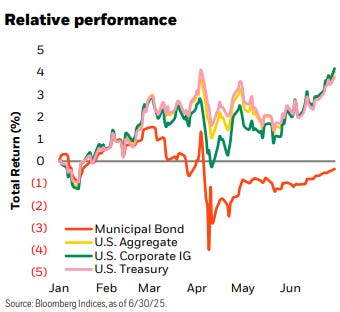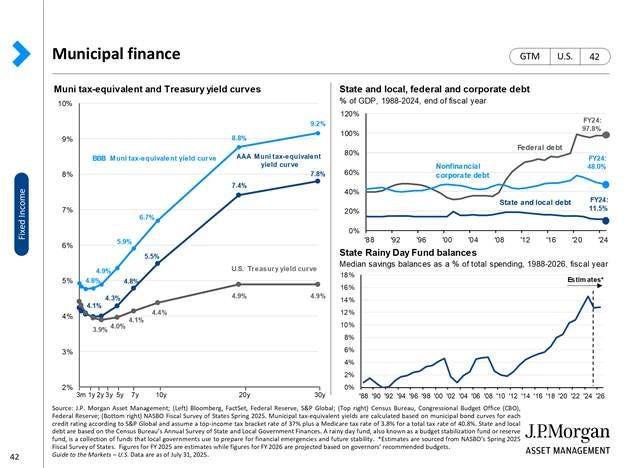The Strange Case of Muni Bonds in 2025
Municipal bonds, also known as "munis," are debt securities issued by a state, local government, or other public authority to finance public projects, such as schools, roads, or hospitals. A key feature is that the interest income from municipal bonds is often exempt from federal income tax and, in some cases, state and local taxes, making them attractive to investors in higher tax brackets.
I bring this up because something weird is happening in the muni market.
First, while the rest of the bond market has had a relatively strong year with positive returns, tax-free municipal bonds have gone down in value.
This first chart from BlackRock illustrates the relative performance of munis (the orange line) relative to other parts of the bond market.

This second chart from JP Morgan illustrates the extent to which tax-equivalent yields surpass those of Treasuries. For someone in the highest tax bracket, there are now 20–to 30–year investment-grade municipal bonds offering tax-equivalent yields that exceed 9%.

It also makes the point that yields have increased, despite most state and local governments being in a better financial position than they have been in recent years.
Why has this happened?
Most bond traders seem to think the reason is mainly technical, caused by a surge in issuance — up over 15% year over year and 55% higher than the 10-year average — driven by fears over potential changes to federal funding and the tax-exempt status of municipal bonds.
Most of these fears didn’t materialize in the most recent round of tax reform, and issuances are expected to normalize as a result.
Why does this matter?
If you are in the highest tax brackets and in the market for tax-free income, muni bonds are more attractive now than they have been in a long time.
But don’t use this as an excuse to abandon your financial plan.
Even relatively safe investments can lose money (as we have seen year to date), and no single investment is safe when it dominates your portfolio. Interest rates can shift, inflation can erode returns, credit ratings can change, and tax laws can be rewritten. Concentration—no matter how “conservative” it feels—is still concentration, and diversification still matters.
Personal Note:
I now find myself in the volunteer role of President of the Fort Bend Panthers Lacrosse, where it is my responsibility to ensure that we introduce lacrosse to as many kids in Fort Bend County as possible.
On Saturday mornings at 9am, we host free clinics. If you know someone who might be interested, please send them my way.





When it comes to writing about investments, the disclaimers are important. Past performance is not indicative of future returns, my opinions are not necessarily those of TSA Wealth Management, an SEC-registered investment advisor, and this is not intended to be personalized legal, accounting, or tax advice etc.
For additional disclaimers associated with TSA Wealth Management please visit https://tsawm.com/disclosure or find TSA Wealth Management's Form CRS at https://adviserinfo.sec.gov/firm/summary/323123